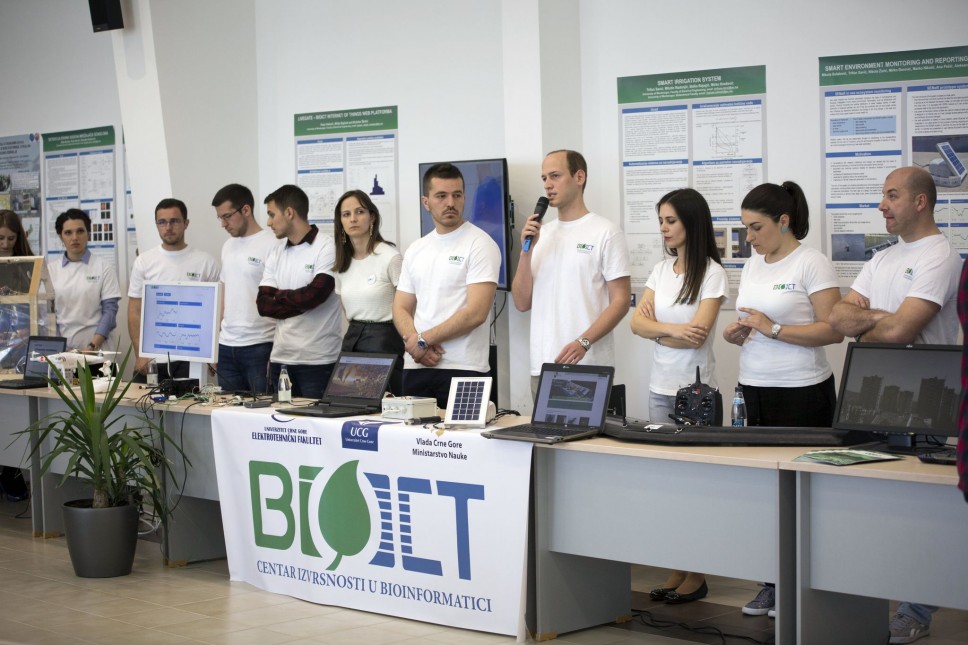BIO-ICT Open Days

BIO-ICT Open Days were organised by BIO-ICT Centre of Excellence in Bioinformatics, on the occasion of marking University of Montenegro Days, from 26 until 28 April at the Sports and Culture Centre of the University of Montenegro and at the Faculty of Electrical Engineering.
During three days of very diversified and interesting programme, all interested parties had the opportunity to learn more about top scientific achievements, modern IT innovations and commercial products and services developed by Montenegrin scientists in the first Montenegrin Excellence Centre.
On the first day, our researchers and professors from the Faculty of Electrical Engineering, Igor Radusinović, Director of the BIO-ICT Centre, Nikša Tadić and Slobodan Đukanović presented their significant scientific results achieved at the BIO-ICT Centre: Measurement of the plant tissue moisture and application in smart irrigation of surface treatments; Use of Landsat8 satellites to evaluate eutrophication of the Bokokotorska Bay and Software-Defined Wireless Sensor Networks. Visitors had the opportunity to visit the BIO-ICT booth where our most significant works and innovations were exposed.
On the second day, Radmila Vojvodić, Rector of the University of Montenegro, highlighted the importance of BIO-ICT Centre for Excellence as a serious pioneering work at the University of Montenegro in the field of science and research, which contributes to the strengthening of the Montenegrin economy through development of new products and services.
Member of the BIO-ICT Centre Miomir Jovanović, Dean of the Biotechnical Faculty, presented our innovations, commercial products and multidisciplinary activities. Our commercial partners at the Centre of Excellence, representatives of Green House Jovović and COGImar, highlighted the benefits and the importance of business and science working together. Veselin Jovović, representative of "Green House-Jovović", said that BIO-ICT inventions enabled electronic monitoring of irrigation and reduction of manpower, expressing his hope that the controlled irrigation system will contribute to even better yields. "This huge potential and knowledge of our youth deserves to be used for creating new products," Jovović pointed out. Ilija Guskić, representative of COGImar from Kotor, said that thanks to the "smart buoy" they get precise data at what time and to what amount the fish should be fed, while the water quality monitoring provides all the information on the conditions for fish farming. As another useful service, he also mentioned Bioportal, which will be beneficial for providing them with better access to customers and sales on the international market.
Young scientists and researchers at the BIO-ICT stand presented their commercial products and services, innovations and ecological monitoring activities developed within the BIO-ICT Centre: SEMaR System, smart buoy with solar power supply for monitoring the parameters of the marine environment in real time; LiveGate, the Internet of Things web platform that enables data collection and analysis of different types of hardware circuits; Smart irrigation system that determines the optimal irrigation period that is directly responsive to climate conditions, soil and plant parameters as to obtain rational water consumption in accordance with plant needs; SharpEye, multimedia sensor platform that seeks to eliminate the need for manual sampling by providing detailed scalar and multimedia information about the environment in which it is located, in order to optimize crop management; DroneMapper, a cloud application that serves to automate georeferencing and create maps with drone images, designed to support multiple users and allow multiple faster map processing; Development of the pedological information system of Montenegro, developed raster maps that are merged through a WEB application, and obtained by clustering and visualization of pedologic data using data mining techniques and spatial interpolation; Continuous biomonitoring of seawater quality using a remote fiber-optic bio-sensor for the registration and analysis of cardiac activity of aquatic invertebrates (mussels); Monitoring of biotoxin in mussels’ meat; Negative effect of mussels’ consumption on Human Health and Green Vegetable Analysis, grown in a controlled environment, with an emphasis on determining the content of antioxidant compounds due to its beneficial effect on human health.
On the second day, BIO-ICT booth was by joined our commercial partners with whom BIO-ICT is working on developing various projects, who will presented their activities on their stands: Amplitudo, software development and distribution company, implementation of ICT solutions; Bureau of Metrology, National Metrology Institute and CETI, Centre for Ecotoxicological Research.
On the last day, Friday, 28 April, an interactive workshop for the Faculty of Electrical Engineering students was held in BIO-ICT and ForeMont labs at the Faculty of Electrical Engineering. Students had the opportunity to work with BIO-ICT researchers and develop their skills in the field of microcontroller programming (arduino), working with databases and programming WEB applications. Students were welcomed by Professor Ana Jovanović, on behalf of the Faculty of Electrical Engineering, and Professor Božo Krstajić, on behalf of BIO-ICT.

